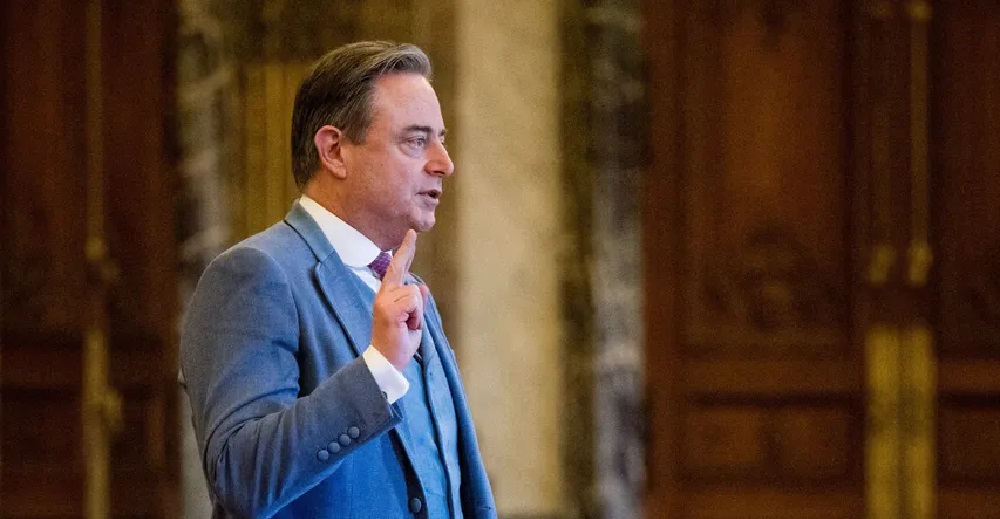Foreign
Belgium swears in new prime minister De Wever

Conservative Bart De Wever was sworn in on Monday as Belgium’s new prime minister after securing a hard-fought coalition deal that shifts the country to the right.
Following seven months of intense negotiations, the agreement makes De Wever the first nationalist from Dutch-speaking Flanders to become Belgian premier.
A law-and-order candidate, whose coalition has already pledged to crack down on irregular migration, De Wever’s rise to power underscores a significant right-wing shift in European politics.
The 54-year-old, who in recent years has softened his stance on calls for Flanders to become an independent country, took the oath of office before King Philippe at the royal palace in Brussels.
From there, he headed straight to a gathering of EU leaders a few blocks away for discussions on defence and transatlantic relations, quipping to reporters that he was “jumping right in.”
On the day’s headline issue, De Wever stated that Belgium was committed to meeting NATO’s longstanding defence spending target of two per cent of GDP, up from the current 1.3 per cent.
“Europe has been a bit lazy on the topic of defence,” he remarked, arguing that Russian President Vladimir Putin “has woken us up.”
Faced with a dual challenge from President Donald Trump—threatening trade tariffs and pressuring allies to ramp up defence spending—De Wever emphasised that the EU must preserve its “relationship with the United States.”
De Wever’s N-VA party is part of the hard-right ECR group in the European Parliament, which also includes lawmakers from the parties of Italian Prime Minister Giorgia Meloni and Czech leader Petr Fiala.
“Our ECR group now has three prime ministers at the European Council table and participates in the government of seven countries,” French hard-right lawmaker Marion Marechal celebrated on X.
Hard-right parties, often riding on anti-immigrant sentiment, performed strongly in the European Parliament elections last year and have topped recent national and regional votes in Austria, Germany, and the Netherlands.
AFP
Foreign
Burkina Faso, Mali, Niger seek access to Atlantic through Morocco

Foreign ministers of military-ruled Sahel states of Burkina Faso, Mali and Niger said on Monday they endorse an initiative offering them access to global trade through Morocco’s Atlantic ports, Reuters reported.
The foreign ministers expressed their countries’ position during a meeting with Morocco’s King Mohammed VI in Rabat, it said.
The West African nations, run by military leaders who took power in coups in recent years, withdrew from the regional grouping ECOWAS last year and formed an alliance known as the Confederation of Sahel States (AES).
Morocco, a major investor in West Africa’s financial and agricultural sectors, announced its trade access initiative in November 2023, after ECOWAS imposed trade restrictions on the three states.
The initiative is conducive to “diversifying our access to the sea,” Mali’s foreign minister Abdoulaye Diop told state media.
The meeting “is part of the strong and longstanding relations of the Kingdom with the three brotherly countries of the Alliance of Sahel States,” Morocco’s news agency said.
The visit takes place as relations between the AES and Algeria, Morocco’s regional rival, deteriorate.
Algeria has cut ties with Morocco and backs the Polisario Front which seeks an independent state in Western Sahara, a territory Morocco considers its own and where it is building a port worth $1 billion.
The new AES grouping expelled French and other Western forces and turned towards Russia for military support.
In December, Morocco mediated the release of four French spies held in Burkina Faso, five months after Paris recognised Rabat’s sovereignty over Western Sahara.
Foreign
Massive power outage hits Spain, Portugal

A massive power outage paralyzed Spain and Portugal on Monday in an incident with no immediate explanation.
“It’s best to not speculate. We will know the causes soon. We are not discarding any hypothesis, but right now, we just focus on what’s most important: returning electricity to our homes,” Spanish Prime Minister Pedro Sánchez said at a news conference Monday.
The stoppage, which occurred about 12:30 p.m. Madrid time, caused chaos across the Iberian Peninsula and showed the vulnerability of Europe’s electrical grid — even on days without extreme weather or spiking demand.
Trains stopped running. Hospitals canceled surgeries, according to news agencies, and depended on backup generators. Business ground to a halt as machines were unable to process credit card transactions. The outage even suspended several Madrid Open tennis matches, with photos showing a court with nonfunctioning scoreboards and darkened stands. Sánchez urged citizens to restrict cellphone use and to call emergency dispatchers only “when it is really necessary.”
By about 5:30 p.m. Madrid time, Red Eléctrica, the corporation that operates Spain’s electricity grid, said some power had been restored across corners of the peninsula, including parts of Catalonia, the Basque Country and Andalusia. About two hours later, the utility provider said more than a fifth of the peninsula’s power had been recovered. Full recovery may take up to 10 hours, Red Eléctrica told Spanish news outlets, which means the country’s power could be restored some time late Monday.
“Causes are being analyzed, and all resources are being dedicated to addressing the issue,” Red Eléctrica said in a statement.
More than 50 million people live on the Iberian Peninsula, but authorities did not provide an immediate estimate for the number of people affected by the outage. Portugal’s national grid operator described it as a “massive cut” in electricity supply across the peninsula. Data from Red Eléctrica showed a sudden plunge in electricity demand from about 27,000 megawatts to less than 13,000. Levels remained abnormally low two hours later.
Spain’s Energy Ministry said in a statement that Sara Aagesen, a deputy prime minister, visited the Red Eléctrica control center to “learn about the situation firsthand and monitor the incident.”
“All necessary measures will be put in place to restore normality as quickly as possible,” the statement said.
Prime Minister Sánchez also held a meeting at the control center, with Aagesen and several other ministers present, the Spanish newspaper El País reported, and Spain’s National Security Council called a meeting to address the outage.
Portugal’s Lusa News Agency said the country’s cybersecurity center had seen no evidence so far that the blackout stemmed from a cyberattack. Separately, the Reuters news agency quoted unnamed officials as saying a cyberattack had not been ruled out.
The Spanish grid also connects with Morocco, France, Andorra and Portugal. Spain and France experienced a major blackout on July 24, 2021, but it lasted less than an hour.
Previous power outages in Europe have been caused by technical problems, lightning strikes and damaged cables. In 2003, Italy faced a huge blackout because a tree was too close to a power line, resulting in a flashover, or a jump of electricity from the line to vegetation.
Foreign
Putin announces three-day Russian ceasefire in Ukraine from 8 May

Russian President Vladimir Putin has announced a temporary ceasefire for the war in Ukraine.
The Kremlin said the ceasefire would run from the morning of 8 May until 11 May – which coincides with victory celebrations to mark the end of World War Two.
In response, Ukraine’s Foreign Minister Andrii Sybiha called for an immediate ceasefire lasting “at least 30 days”.
While US President Donald Trump, who has been attempting to broker a truce between the two sides, said he wants to see a permanent ceasefire, the White House said.
The Kremlin announced a similar, 30-hour truce over Easter, but while both sides reported a dip in fighting, they accused each other of hundreds of violations.
Ceasefires have been attempted more than 20 times in Ukraine – all of them failed eventually, and some within minutes of going into effect.
The most recent one, over Easter, was very limited in scope and only resulted in a slight reduction in fighting, with both sides accusing each other of violating the truce.
In a statement on Monday, the Kremlin said Putin declared the ceasefire “based on humanitarian considerations”.
A translation of the statement said: “Russia believes that the Ukrainian side should follow this example.
“In the event of violations of the ceasefire by the Ukrainian side, the Armed Forces of the Russian Federation will give an adequate and effective response.
“The Russian side once again declares its readiness for peace talks without preconditions, aimed at eliminating the root causes of the Ukrainian crisis, and constructive interaction with international partners.”
Following its release, Ukrainian Foreign Minister Sybiha said: “If Russia truly wants peace, it must cease fire immediately.”
“Why wait until May 8th?” he wrote on X. “If the fire can be ceased now and since any date for 30 days—so it is real, not just for a parade.”
He said Ukraine is ready to support a “lasting, durable, and full ceasefire. And this is what we are constantly proposing, for at least 30 days”.
White House press secretary Karoline Leavitt said Trump was growing “frustrated with leaders of both countries”.
“He wants to see a permanent ceasefire.
“I understand Vladimir Putin this morning offered a temporary ceasefire. The president has made it clear he wants to see a permanent ceasefire first to stop the killing, stop the bloodshed.”
The latest announcement comes during what the US has described as a “very critical” week for Russia-Ukraine peace talks.
Washington has been trying to broker a deal between the two sides, but the Donald Trump administration has threatened to pull out if they do not see progress.
Putin is keen to create the impression that Russia is serious about seeking peace – and he is keen for Trump to hear that message given Ukraine has accepted Washington’s proposal for a more lasting 30-day ceasefire.
It comes after the US president expressed annoyance with Russia’s continued attacks on Ukraine.
Russia launched a full-scale invasion of Ukraine on 24 February 2022, and currently controls about 20% Ukraine’s territory, including the southern Crimea peninsula annexed by Moscow in 2014.
It is estimated that hundreds of thousands of people – the vast majority of them soldiers – have been killed or injured on all sides since 2022.
-

 Metro22 hours ago
Metro22 hours agoGunmen storm University of Benin teaching hospital, kill doctor
-

 Metro22 hours ago
Metro22 hours agoFCTA destroys 601 motorbikes over violations
-

 News14 hours ago
News14 hours agoAlleged money laundering: EFCC produces Aisha Achimugu in court
-

 News22 hours ago
News22 hours agoJust in: FG declares tomorrow public holiday
-

 News15 hours ago
News15 hours agoJUST IN: Major General Paul Ufuoma Omu Rtd, dies at 84
-

 News15 hours ago
News15 hours agoTinubu hails Dangote’s World Bank appointment
-

 News9 hours ago
News9 hours agoHon. Dennis Agbo Resigns From Labour Party
-

 News9 hours ago
News9 hours agoJust in: Osun PDP receives defectors from APC, others


















